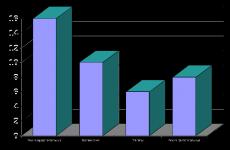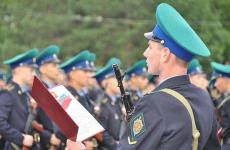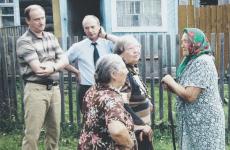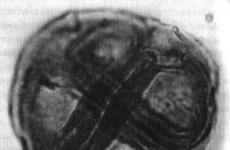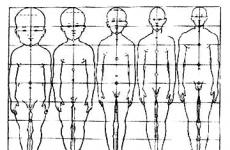Джозеф джейкобс английские сказки. Биография и деятельность
Joseph Jacobs (1854-1916), scholar and historian, was born on 29 August 1854 in Sydney, sixth surviving son of John Jacobs, a publican who had migrated from London about 1837, and his wife Sarah, née Myers. Entering Sydney Grammar School in 1867, he won the (Sir Edward) Knox prize twice and was school captain in 1871. Next year, on a scholarship, he studied arts at the University of Sydney and won many prizes. In October 1873 he was admitted as a pensioner to St John"s College, Cambridge (B.A., 1877, senior moralist).
In an essay, "Mordecai", in Macmillan"s Magazine in 1877, Jacobs had replied to criticism of the Jewish part of George Eliot"s Daniel Deronda ; later Eliot became a close friend. That year Jacobs studied in Berlin under the famous Jewish scholars Moritz Steinschneider and Moritz Lazarus. Returning to England he was secretary of the Society of Hebrew Literature in 1878-84. At the St Pancras registry office, London, on 3 April 1880 he married Georgina Horne, daughter of a livery-stable keeper; she bore him two sons and a daughter. In January 1882 he wrote articles for The Times on the persecution of the Jews in Russia and became honorary secretary until 1900 of what became the Russo-Jewish Committee. This connexion led him to investigate the general Jewish question in articles to the Jewish Chronicle and the Journal of the (Royal) Anthropological Institute of Great Britain and Ireland.
With Lucien Wolf, Jacobs prepared the Catalogue of the Anglo-Jewish Historical Exhibition of 1887 and Bibliotheca Anglo-Judaica , on which all future work in Anglo-Jewish history was based. In 1893 his important work, The Jews of Angevin England , appeared and that year he was a founder of the Jewish Historical Society of England (president, 1898-99). His anthropological studies had led him to folklore; he edited several books of fables and in his generation became one of the most popular writers of fairy tales for English-speaking children. He edited the magazine Folk-lore and the Papers and Transactions of the 1891 International Folk-Lore Congress in London. He even wrote a novel on the life of Jesus, As Others Saw Him , published anonymously in 1895.
A master of many languages, Jacobs translated Hebrew, Italian and Spanish works, and brought out new editions of English classics. For many years he was a member of the executive committee of the Anglo-Jewish Association and of its joint foreign committee with the Board of Deputies of British Jews. In 1896-99 he published the first issues of the Jewish Year Book .
In 1896 Jacobs visited the United States of America to lecture on philosophy and returned in 1900 as revising editor of The Jewish Encyclopaedia ; he was responsible for its style and contributed several hundred articles. On completing the Encyclopaedia in 1906, he became registrar and professor of English at the Jewish Theological Seminary of America in New York. He retired in 1913 to become chief editor of the American Hebrew and Jewish Messenger . His incomplete Jewish Contributions to Civilization was published posthumously in 1919.
Jacobs died of heart disease at his home at Yonkers, New York, on 30 January 1916 and was buried in Temple Emanuel cemetery, Mt Hope. Australian Jewry can claim this great and gentle scholar, whose versatile ability knew no bounds, as an outstanding son; yet because his contribution to his people was intellectual and his life spent far from his homeland, he is nearly forgotten in Australia.
Критик, фольклорист, историк, статистик и общественный деятель, род. в Сиднее (Австралия) в 1854 г. и по получении диплома в Лондоне специализировался в Кембридже и Берлине, где был учеником Лацаруса и Штейнталя, побудивших его заняться вопросами народной психологии и этнографии. По возвращении в 1878 году в Лондон стал секретарем Общества еврейской литературы. Дебютировал на литературном поприще статьями в «Times» от 11 и 13 января 1882 года, в которых обратил внимание Европы на происходившие в 1881 г. в России погромы, и выступил одним из организаторов известного митинга-протеста, происходившего в Лондоне 1 февраля 1882 г. и вызвавшего к жизни особый комитет для защиты евреев, сначала известный под именем Маnsion House, а потом Russo-Jewish. Как секретарь его, Джекобс вел переписку со многими лицами, жившими в разных странах и знакомыми с положением евреев на местах, и приобрел весьма ценный материал по еврейскому вопросу. Результатом собирания им сведений и собственных исследований явились его весьма обстоятельный труд по библиографии (1885), а также различные очерки о социальном положении евреев в разных странах Европы; серия его статей, посвященная статистике евреев, обращает на себя внимание богатством данных и оригинальными выводами Англо-еврейская историческая выставка 1887 г., почетным секретарем литературно-художественной секции которой состоял Джекобс, побудила его заняться еврейской историей. Когда он вместе с Люсьеном Вольфом приступил к изданию полной библиографии по истории евреев в Англии, то уже настолько овладел этим предметом, что мог считаться одним из лучших англо-еврейских историков. Изучение истории евреев в Англии вскоре сильно увлекло Джекобса, и он занялся историей евреев вообще и отправился в Испанию для ознакомления с архивным материалом по еврейской истории; здесь он в короткое время собрал ценный материал, опубликованный им в 1893 г. под названием «Sources of Spanish-Jewish history». Еще ранее (1891) он в связи с митингом в Guildhall’e по поводу преследований евреев в России издал публицистическую, но не лишенную и исторического значения книгу, подробно излагающую историю преследований евреев в России, причем в виде приложения к своему труду дал краткий очерк русского законодательства о евреях. Лучшим историческим трудом Джекобса считается книга «Jewis of Angevin England» (1893), посвященная раннему периоду пребывания евреев в Англии; сочинение это до сих пор является весьма ценным источником по истории евреев в Англии до их первого изгнания из страны. В 1896 году им был издан ряд интересных очерков по истории евреев и по еврейской философии под общим названием «Jewish ideals»; в том же году вышел и первый выпуск его Jewish Year Book. Выдающийся художественный критик, Джекобс. поместил в «Аthеnаеum’е» ряд статей о великих английских писателях и в 1894 г. выпустил сборник очерков о Дж. Эллиоте, Стивенсоне, Арнольде и др. под заглавием «Literary essays»; его же перу принадлежит большая монография о Теннисоне и т. д. Кроме того, Джекобс издал ряд сочинений английских классиков со вступительными очерками и комментариями; издания эти пользуются в Англии большой известностью и сделали его имя популярным в широких народных массах. В 1896 г. отправился в Соединенные Штаты и читал лекции по философии еврейской истории в колледже Граца в Филадельфии, а также в различных учреждениях Чикаго и Нью-Йорка. В 1900 г. Джекобс переселился в Нью-Йорк и стал одним из редакторов «Jewish Encycl.», поместив в ней ряд больших статей и заметок и подписывая их в большинстве случаев буквой J. В то же время состоял деятельным сотрудником «Jew. Chronicle» (Лондон), «Jew. World» (Нью-Йорк), а также одним из редакторов-издателей «Jewish Charity». Д. считается одним из лучших английских фольклористов, был издателем журнала «Folklore», почетным секретарем Международного общества фольклора и главным руководителем литературного комитета лондонского конгресса 1881 г. фольклористов. Его перу принадлежит в этой области ряд весьма значительных работ. Выдающийся археолог, Джекобс применял научные археологические методы к изучению Библии и дал в «Studies in Biblical Archeology» (1894) ряд основанных на сравнительном методе интересных заключений, касающихся Библии. Его перу принадлежит также изображение жизни Иисуса Христа с еврейской точки зрения, «As otheres saw Him», 1895, 3 изд. 1903. - Cp.: Men and women of the time, 1894; Diction. intern. des folkloristes, 1899; Whos Who in England; Whos Who in America; Nat. Dict. of Amer. Biogr.; Enc. of Am. Biogr., 1903; Critic (Нью-Йорк). 1897, 23 января; Cat. Brit. Mus., supplem., 1903, s. v. .
, фольклорист , историк , статистик и общественный деятель. Считался одним из лучших английских фольклористов, был издателем журнала «Folklore», почётным секретарем Международного общества фольклора и главным руководителем литературного комитета лондонского конгресса 1881 г. фольклористов. Автор ряда значительных работ в этой области. Применял научные археологические методы к изучению Библии и дал в «Studies in Biblical Archeology» (1894) ряд основанных на сравнительном методе заключений, касавшихся Библии. Изобразил жизнь Иисуса Христа с еврейской точки зрения в книге «As Others Saw Him» (1895). Один из редакторов первой еврейской энциклопедии («Jewish Encyclopedia »; 1901-1906).
Биография и деятельность
Джозеф Джекобс родился в Сиднее (Австралия) в 1854 г. Сын Джона Джекобса и его жены Сары. Обучался в en:Sydney grammar school и местном университете , который не закончил: в 18 лет уехал учиться в Лондоне.
Лондонский период
Дебютировал на литературном поприще статьями в «Times » от 11 и 13 января 1882 года, в которых обратил внимание Европы на происходившие в 1881 году в России погромы , и выступил одним из организаторов известного митинга-протеста, происходившего в Лондоне 1 февраля 1882 г. и вызвавшего к жизни особый комитет для защиты евреев, сначала известный под именем «Маnsion House», а потом «Russo-Jewish». Как секретарь комитета, Джекобс вёл переписку со многими лицами, жившими в разных странах и знакомыми с положением евреев на местах, и приобрёл весьма ценный материал по еврейскому вопросу. Результатом сбора сведений и собственных исследований стал его весьма обстоятельный труд по библиографии (1885), а также различные очерки о социальном положении евреев в разных странах Европы; серия его статей, посвящённая статистике евреев, обращала на себя внимание богатством данных и оригинальными выводами (важнейшие статьи Джекобса вышли отдельным изданием в 1890 году под заглавием «Studies in Jewish statistics», став практически первым научно-статистическим материалом по еврейскому вопросу). В 1891 году, в связи с митингом в Гилдхолле по поводу преследований евреев в России, он издал публицистическую, но не лишённую и исторического значения книгу, подробно излагающую историю преследований евреев в России, причём в виде приложения к своему труду дал краткий очерк русского законодательства о евреях.
Англо-еврейская историческая выставка 1887 г., почётным секретарём литературно-художественной секции которой состоял Джекобс, побудила его заняться еврейской историей. Когда он вместе с Люсьеном Вольфом приступил к изданию полной библиографии по истории евреев в Англии , то уже настолько владел темой, что мог считаться одним из лучших англо-еврейских историков. Увлёкшись историей евреев вообще, Джекобс отправился в Испанию для ознакомления с архивным материалом по еврейской истории; там в короткое время собрал ценный материал, опубликованный им в 1893 г. под названием «Sources of Spanish-Jewish history».
Лучшим историческим трудом Джекобса считается книга «Jewis of Angevin England» (1893), посвящённая раннему периоду пребывания евреев в Англии до их первого изгнания из страны (1290) .
В 1896 году им был издан ряд очерков по истории евреев и по еврейской философии под общим названием «Jewish ideals»; в том же году вышел и первый выпуск его Jewish Year Book .
Как художественный критик, Джекобс поместил в «Аthеnаеum’е» ряд статей о великих английских писателях и в 1894 г. выпустил сборник очерков о Дж. Эллиоте , Стивенсоне , Арнольде и других под заглавием «Literary essays»; его же перу принадлежит большая монография о, одним из основателей которого был, а также председателем Общества Маккавеев (Knights of the Maccabees). Член исполнительного комитета Аnglо-Jewish Association, он оказал этому обществу большие услуги.
Нью-Йоркский период
В 1900 г. Джекобс переселился в Нью-Йорк и стал одним из редакторов «Jewish Encyclopedia », поместив в ней ряд больших статей и заметок и подписывая их в большинстве случаев буквой J . В то же время Джекобс состоял деятельным сотрудником «Jewish Chronicle» (Лондон), «Jewish World» (Нью-Йорк), а также одним из редакторов-издателей «Jewish Charity».
Был женат на Georgina Horne, с которой у них было два сына и дочь.
Biography
Jacobs was born in Australia, sixth surviving son of John Jacobs, a publican who had emigrated from London c.1837, and his wife Sarah, née Myers. Jacobs was educated at Sydney Grammar School and at the University of Sydney, where he won a scholarship for classics, mathematics and chemistry. He did not complete his studies in Sydney, but left for England at the age of 18 and entered St John"s College, Cambridge. He graduated B.A. in 1876, and in 1877 studied at the University of Berlin. He was secretary of the Society of Hebrew Literature from 1878 to 1884, and in 1882 came into prominence as the writer of a series of articles in The Times on the persecution of Jews in Russia. This led to the formation of the mansion house fund and committee, of which Jacobs was secretary from 1882 to 1900.
In 1888 he prepared with Lucien Wolf Bibliotheca Anglo-Judaica: A Bibliographical Guide to Anglo-Jewish History , and in 1890 he edited English Fairy Tales , the first of his series of books of fairy tales published during the next 10 years. He wrote many literary articles for the Athenaeum, a collection of which, George Eliot, Matthew Arnold, Browning, Newman, Essays and Reviews from the Athenaeum was published in 1891. In the same year appeared his Studies in Jewish Statistics , in 1892, Tennyson and "In Memoriam" , and in 1893 his important book on The Jews of Angevin England . In 1894 were published his Studies in Biblical archaeology , and An Inquiry into the Sources of the History of the Jews in Spain , in connection with which he was made a corresponding member of the Royal Academy of History of Madrid. His As Others Saw Him , a historical novel dealing with the life of Christ, was published anonymously in 1895, and in the following year his Jewish Ideals and other Essays came out. In this year he was invited to the United States of America to give a course of lectures on the "Philosophy of Jewish History". The Story of Geographical Discovery was published towards the end of 1898 and ran into several editions. He had been compiling and editing the Jewish Year Book since 1896, and was president of the Jewish Historical Society of England in 1898-9. In 1900 he accepted an invitation to become revising editor of the Jewish Encyclopaedia which was then being prepared at New York.
Folklore
From 1899-1900 he edited the journal Folklore , and from 1890 to 1912 he edited five collections of fairy tales: English Fairy Tales , More English Fairy Tales , Celtic Fairy Tales , More Celtic Fairy Tales , and , which were published with distinguished illustrations by John Dickson Batten. He was inspired in this by the Brothers Grimm and the romantic nationalism common in folklorists of his age; he wished English children to have access to English fairy tales, whereas they were chiefly reading French and German tales; in his own words, "What Perrault began, the Grimms completed."
Although he collected many tales under the name of fairy tales, many of them are unusual sorts of tales. Binnorie and Tamlane are prose versions of ballads, The Old Woman and Her Pig is a nursery rhyme, Henny-Penny is a fable, and The Buried Moon has mythic overtones to an extent unusual in fairy tales. According to his own analysis of English Fairy Tales , "Of the eighty-seven tales contained in my two volumes, thirty-eight are Märchen proper, ten sagas or legends, nineteen drolls, four cumulative stories, six beast tales, and ten nonsense stories."
Jacobs settled permanently in the United States. He wrote many articles for the Jewish Encyclopaedia , and was generally responsible for the style of the whole publication. It was completed in 1906, and he then became registrar and professor of English at the Jewish Theological Seminary of America at New York. In 1908 he was appointed a member of the board of seven, which made a new English translation of the Bible for the Jewish Publication Society of America. In 1913 he resigned his positions at the seminary to become editor of the American Hebrew . He died on 30 January 1916. He married Georgina Horne and fathered two sons and a daughter. In 1920, Book I of his Jewish Contributions to Civilization, which was practically finished at the time of his death, was published at Philadelphia.
In addition to the books already mentioned, Jacobs edited The Fables of Aesop as First Printed by Caxton (1889), Painter"s Palace of Pleasure (1890), Baltaser Gracian"s Art of Worldly Wisdom (1892), Howell"s Letters (1892), Barlaam and Josaphat (1896), The Thousand and One Nights (6 vols, 1896), and others. Jacobs was also a contributor to the Encyclopaedia Britannica , and James Hastings" Encyclopaedia of Religion and Ethics .
Works
- Earliest English Version of the Fables of Bidpai (1888)
- Celtic Fairy Tales (1892 anthology)
- Fables of Aesop (1889)
- English Fairy Tales (1890), which includes:
- Tom Tit Tot
- The Three Sillies
- The Rose-Tree
- The Old Woman and Her Pig
- How Jack Went to Seek his Fortune
- Mr Vinegar
- Nix Nought Nothing
- Jack Hannaford
- Binnorie
- Mouse and Mouser
- Cap O" Rushes
- Teeny-Tiny
- Jack and the Beanstalk
- The Story of the Three Little Pigs
- The Master and His Pupil
- Titty Mouse and Tatty Mouse
- Jack and His Golden Snuff-Box
- The Story of the Three Bears
- Jack the Giant Killer
- Henny-Penny
- Childe Rowland
- Molly Whuppie
- The Red Ettin
- The Golden Arm
- The History of Tom Thumb
- Mr Fox
- Lazy Jack
- Johnny-Cake
- Earl Mar"s Daughter
- Mr Miacca
- Whittington and His Cat
- The Strange Visitor
- The Laidly Worm of Spindleston Heugh
- The Cat and the Mouse
- The Fish and the Ring
- The Magpie"s Nest
- Kate Crackernuts
- The Cauld Lad of Hilton
- The Ass, The Table and the Stick
- Fairy Ointment
- The Well of the World"s End
- Master of all Masters
- The Three Heads of the Well
- The Jews of Angevin England (1893)
- More English Fairy Tales
(1894)
- The Pied Piper
- Hereafterthis
- The Golden Ball
- My Own Self
- Black Bull of Norroway
- Yallery Brown
- Three Feathers
- Sir Gammer Vans
- Tom Hickathrift
- The Hedley Kow
- Gobborn Seer
- Lawkamercyme
- Tattercoats
- The Wee Bannock
- Johnny Gloke
- Coat o" Clay
- The Three Cows
- The Blinded Giant
- Scrapefoot
- The Pedlar of Swaffham
- The Old Witch
- The Three Wishes
- The Buried Moon
- A Son of Adam
- The Children in the Wood
- The Hobyahs
- A Pottle o" Brains
- The King of England and his Three Sons
- King John and the Abbot of Canterbury
- Rushen Coatie
- The King o" the Cats
- Tamlane
- The Stars in the Sky
- News!
- Puddock, Mousie and Ratton
- The Little Bull-Calf
- The Wee, Wee Mannie
- Habetrot and Scantlie Mab
- Old Mother Wiggle-Waggle
- Catskin
- Stupid"s Cries
- The Lambton Worm
- The Wise Men of Gotham
- Princess of Canterbury
- Celtic Fairy Tales (1892)
- Connla and the Fairy Maiden
- Guleesh
- The Field of Boliauns
- The Horned Women
- Conall Yellowclaw
- Hudden and Dudden and Donald O"Neary
- The Shepherd of Myddvai
- The Sprightly Tailor
- The Story of Deirdre
- Munachar and Manachar
- Gold-Tree and Silver-Tree
- King O"Toole and his Goose
- The Wooing of Olwen
- Jack and his Comrades
- The Shee An Gannon and the Gruagach Gaire
- The Story-Teller at Fault
- The Sea-Maiden
- A Legend of Knockmany
- Fair, Brown and Trembling
- Jack and his Master
- Beth Gellert
- The Tale of Ivan
- Andrew Coffey
- The Battle of the Birds
- Brewery of Eggshells
- The Lad with the Goat-Skin
- Notes and References
- Studies in Biblical Archaeology (1894)
- More Celtic Fairy Tales (1894)
- The Fate of the Children of Lir
- Jack the Cunning Thief
- Powel, Prince of Dyfed
- Paddy O"Kelly and the Weasel
- The Black Horse
- The Vision of MacConglinney
- Dream of Owen O"Mulready
- Morraha
- The Story of the McAndrew Family
- The Farmer of Liddesdale
- The Greek Princess and the Young Gardener
- The Russet Dog
- Smallhead and the King"s Sons
- The Legend of Knockgrafton
- Elidore
- The Leeching of Kayn"s leg
- How Fin went to the Kingdom of the Big Men
- How Cormac Mac Art went to Faery
- The Ridere of Riddles
- The Tail
- Contributor to the Jewish Encyclopedia , from 1900
- Indian Fairy Tales (1912)
- The Lion and the Crane
- How the Raja"s Son won the Princess Labam
- The Lambikin
- Punchkin
- The Broken Pot
- The Magic Fiddle
- The Cruel Crane Outwitted
- Loving Laili
- The Tiger, the Brahman, and the Jackal
- The Soothsayers Son
- Harisarman
- The Charmed Ring
- The Talkative Tortoise
- A Lac of Rupees for a Piece of Advice
- The Gold-Giving Serpent
- The Son of Seven Queens
- A Lesson for Kings
- Pride Goes Before a Fall
- Raja Rasalu
- The Ass in the Lion"s Skin
- The Farmer and the Money-Lender
- The Boy who had a Moon on his Forehead and a Star on his Chin
- The Prince and the Fakir
- Why the Fish Laughed
- The Demon with the Matted Hair
- The Ivory City and its Fairy Princess
- Sun, Moon, and Wind go out to Dinner
- How the Wicked Sons were Duped
- The Pigeon and the Crow
- European Folk and Fairy Tales (1916)
- Cinder-Maid
- All Change
- The King of the Fishes
- Scissors
- Beauty and the Beast
- Reynard and Bruin
- The Dancing Water, Singing Apple, and Speaking Bird
- The Language of Animals
- The Three Soldiers
- A Dozen At a Blow
- The Earl of Cattenborough
- The Swan Maidens
- Androcles and the Lion
- Day Dreaming
- Keep Cool
- The Master Thief
- The Unseen Bridegroom
- The Master-Maid
- A Visitor From Paradise
- Inside Again
- John the True
- Johnnie and Grizzle
- The Clever Lass
- Thumbkin
- Snowwhite

